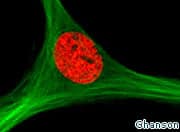A scientist has been awarded a Nobel Prize for his pioneering ethical research into stem cells which doesn’t destroy embryos.
Professor Shinya Yamanaka, from Japan, was motivated to come up with an alternative to embryonic stem cell research because he caught a glimpse of an embryo at a friend’s fertility clinic.
He said: “When I saw the embryo, I suddenly realised there was such a small difference between it and my daughters”.
Destroying
“I thought, we can’t keep destroying embryos for our research. There must be another way”, he continued.
Prof Yamanaka received the prize for changing adult cells into stem cells.
He shared the award with Professor John Gurdon, from the UK, whose original research Prof Yamanaka built on.
Rebooting
Prof Yamanaka’s research involved taking adult stem cells and rebooting them, to turn them into “blank slates” – like embryonic stem cells that can then be turned into any cell in the body.
The Nobel committee said the discovery has lead to “remarkable progress in many areas of medicine”.
It is hoped the technique could be used to reverse the progress of Alzheimer’s disease, or repair the heart after a heart attack.

